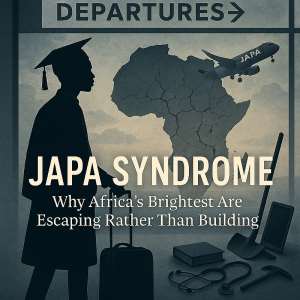
: Why Africa’s Brightest Are Escaping Rather Than Building
In recent years, Africa has witnessed an alarming surge in what has now become colloquially known as the “” a term popularized in Nigeria, derived from Yoruba meaning “to run swiftly or escape.” It encapsulates a new wave of migration where the continent’s brightest minds doctors, engineers, academics, students, and professionals are fleeing in search of greener pastures in Europe, North America, and beyond. While migration in itself is not a novel phenomenon, the volume, velocity, and demographic profile of those leaving Africa today raise serious questions about the future of the continent.
At the heart of the is a paradox: Why are Africa’s most educated and skilled individuals those best equipped to drive transformation choosing escape over engagement? Why are they investing their talents in foreign economies instead of building their own nations?
The reasons are multifaceted but not mysterious. Poor governance, insecurity, decaying infrastructure, and lack of economic opportunities have all combined to erode hope in many African countries. Professionals toil under systems that neither value nor reward merit. In some cases, excellence is even punished, and mediocrity rewarded. Graduates emerge from universities only to face years of unemployment or underemployment. Teachers are owed months of salaries, researchers lack funding, and young entrepreneurs are stifled by bureaucracy and corruption.
For a continent blessed with abundant natural and human resources, the contradiction is painful. According to the African Union, over 70,000 skilled professionals emigrate from Africa annually. Countries like Nigeria are witnessing an exodus of health workers, educators, and IT specialists. Ghana, Kenya, Ethiopia, and South Africa report similar trends. The irony is that many of these individuals thrive abroad becoming consultants, professors, tech innovators, and leaders achievements they might never have attained had they stayed back.
But the brain drain is more than statistics; it is a slow bleed of Africa’s soul. With every JAPA success story abroad, another community at home loses a potential change-maker. Hospitals lose competent doctors. Universities lose passionate lecturers. Young people lose role models. The cumulative effect is stagnation and cyclical dependence on foreign aid, foreign experts, and foreign systems ironically sustained by the very Africans who have left.
Still, it is important not to vilify those who leave. Migration is often a rational response to irrational systems. Wanting a better life is not a betrayal; it is human. The real question is: What must Africa do to retain its brightest? How can we create environments where talent is nurtured, not suffocated?
First, we must confront leadership failure with honesty. Accountability, visionary governance, and investment in youth must be at the core of national priorities. Education should not be an afterthought but a foundation. Innovation should be rewarded, and the dignity of labour restored. The private sector, too, must rise to the challenge by supporting young startups, creating inclusive workplaces, and reducing the culture of exploitation.
Secondly, we must change the narrative. Not every dream needs to be fulfilled abroad. Africa’s soil can nurture greatness if irrigated with sincerity, justice, and investment. Diaspora Africans must also recognize their power not only in remittances but in returning home with ideas, partnerships, and renewed commitment. Those who have stayed back, against all odds, must be celebrated and supported, not mocked.
The is not irreversible. But reversing it requires more than patriotic slogans. It demands structural change, grassroots empowerment, and a collective belief that Africa is worth staying for, fighting for, and building.
Until that happens, the continent will continue to educate its best minds for export and mourn their absence in silence.


